Obama Dolls It Up for Ann Arbor Dems

Barack Obama holds a quilt of his family at the White House, made by Susan Walen. It was part of a folk art exhibit for the Ann Arbor Democratic Party's Labor Day picnic at the Elks Pratt Lodge. (Photo by the writer.)
The Chronicle first heard about Doug Kelley’s collection of Obama folk art when we met him at a health care forum last month, so when we learned that he’d be exhibiting part of it at the annual Ann Arbor Democratic Party‘s Labor Day picnic, we headed to the Elks Pratt Lodge on Monday to check it out.
The collection – two pairs of dolls, a quilted hanging, a hook rug, a walking stick, and several other items – includes original, somewhat eccentric work by artists from Ann Arbor and across the country.
Kelley gives frequent exhibits from his extensive Democratic Party archive – on Oct. 3, he’ll be displaying a collection of items related to voting rights at the annual meeting of the Washtenaw County Democratic Party. That meeting will feature civil rights activist John Lewis as guest speaker. But the Labor Day display was unique in at least one way: “It’s the first exhibit I’ve ever done that offers free peanuts,” Kelley said, pointing to a plastic dish filled with nuts for the taking.
So as rank-and-file Dems noshed and mingled with elected officials on the wraparound porch of the Elks lodge, we chatted with Kelley about some of the more unusual pieces he’s acquired.
Obama Dolls: Kathy Snyder
Local dollmaker Kathy Snyder had never before attempted a political subject, Kelley said, but she made two sets of Barack and Michelle Obama dolls for Kelley – and has now sold more than $1,000 worth of the dolls through the local Democratic Party.

Skylar Pryor plays with Barack and Michelle Obama dolls made by local craftswoman Kathy Snyder. They're sitting in a wooden toy swingset that Doug Kelley, who owns the collection, found at Treasure Mart. (Photo by the writer.)
One set of dolls stands 21 inches high – the Michelle Obama doll in this set wears a hand-painted red-and-black dress modeled after the one she wore at the election night celebration in Chicago’s Grant Park. All of the clothing is meticulously crafted, Kelley says: “They even have underwear!” Snyder’s 17-inch Obama dolls sell for $50 each or $95 for the pair. The 21-inch Obamas cost $195 for the set.
Wall Hanging: Susan Walen
Earlier this year Kelley got a call from his son Peter, who was in the Washington, D.C. area at a quilt show. “He said, ‘You’re never going to believe it – all the quilts are about Obama!’” Kelley recalled. The show had been organized by Bethesda, Md. artist Susan Walen, and Kelley ended up acquiring two of her quilted wall hangings. The one on display at the Labor Day picnic shows the Obama family at the White House. For the record, Kelley notes that the dog pictured in the quilt is a different breed from Bo, the Obama’s Portuguese water dog. Walen made the quilt after they’d announced plans to get a puppy, but before they actually chose one.
Kelley also brought a copy of a book put together by Walen: “President Obama – A Celebration in Art Quilts.” In it, there’s a picture of the other quilted wall hanging he owns, which was too large to bring to the Labor Day picnic. Titled “Dear Mr. Obama …” it includes an image of Obama and a nine-page letter that Walen wrote to him – she discusses the piece in an interview published on the Alliance for American Quilts website.

Doug Kelley with Steve Shepard's portraits of Barack Obama and Hillary Clinton. (Photo by the writer.)
Obama/Clinton Portraits: Steve Shepard
Steve Shepard is an artist from Gautier, Miss. who won best of show several years ago at the Ann Arbor Street Art Fair – that’s where Kelley first learned of his work. Shepard suffered financial losses in the wake of Hurricane Katrina that have prevented him from traveling back to Ann Arbor, but Kelley has kept in touch and purchased several pieces, including portraits of Obama and Hillary Clinton.
Kelley made a point of noting that the artist had not been advocating an Obama/Clinton ticket – it was Kelley’s decision to frame the two portraits together.
In addition to the work on display at the Labor Day picnic, Kelley also owns another piece of Shepard’s artwork: A portrait of Obama painted on a seven-foot-long slice of cypress wood.
Walking Stick: Victoria Fox Robertello
Artist Victoria Fox Robertello lives in Britton, Mich., and is a regular at the Ann Arbor Farmers Market, where she’s best known for making elaborate fish out of driftwood and other found timber.
But during the 2008 presidential campaign, she made several items that are now in Kelley’s collection. For Monday’s display he brought three of them: Two wooden signs that Kelley and Patrick Boeheim, a Washtenaw Democratic Party officer, carried in the 2008 and 2009 Ann Arbor July Fourth parades; and an elaborately painted Uncle Sam walking stick, made from a crooked piece of wood that forks into two “legs.”

A detail from a walking stick by Victoria Fox Robertello made during the 2008 presidential campaign. (Photo by the writer.)
More Obama Folk Art
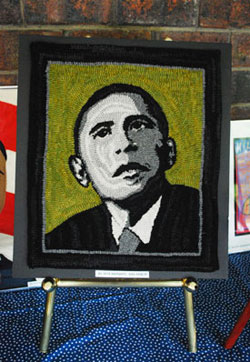
Rita Barnard of Ann Arbor made this hook rug using a poster that Doug Kelley provided as inspiration. (Photo by the writer.)
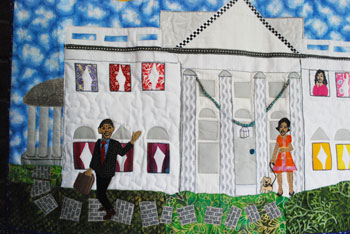
Detail from a quilted wall hanging by Susan Walen, showing the Obama family at the White House. For the record, the puppy next to Michelle Obama is not a Portuguese water dog. (Photo by the writer.)
Scenes from the Ann Arbor Democratic Party Labor Day picnic
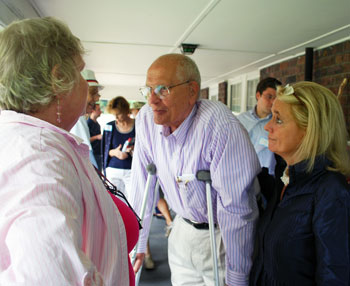
Congressman John Dingell and his wife, Debbie Dingell, right, talk to Lois Mayfield on the porch of the Elks Pratt Lodge. (Photo by the writer.)
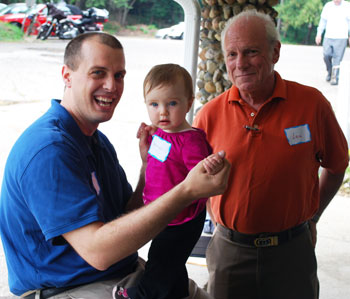
Jeff Irwin, a Washtenaw County commissioner, with his daughter Sylvia, talking to radio talk show host Lou Perry. (Photo by the writer.)
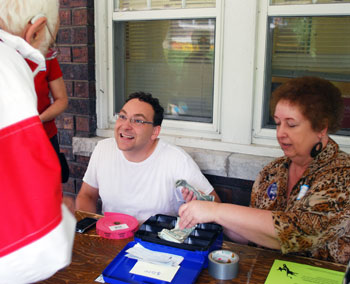
Conan Smith, chair of the Ann Arbor Democratic Party and a Washtenaw County commissioner, sells tickets to the Labor Day picnic with Kathy Wyatt, vice chair for membership and outreach of the Washtenaw County Democratic Party. (Photo by the writer.)







It appears as if the author intended to convey that the image of President Obama at the top of the article is actually a photograph of the President himself rather than of a cardboard cutout. This seems at best an error of omission, and I think it reflects poorly on the editorial and journalistic judgement of the Chronicle to let it pass without correction.
That’s a puzzling comment. There are plenty of news photos that can be a little hard to parse that might actually affect a readers understanding of the issue–why single out this seemingly benign one? Do you think there’s some false message being sent or some distortion of the record?
Re: [1] “This seems at best an error of omission, and I think it reflects poorly on the editorial and journalistic judgement of the Chronicle to let it pass without correction.”
I edited this piece. The caption to the photograph of the cutout, “President Obama holds a quilt …” does not, in my view, reflect an attempt on the part of the author to misrepresent a cutout as the President himself. The certitude with which Felix states that it’s a cutout, not the President, supports the view (which I share) that a cursory look after a first glance allows the easy conclusion that it’s a cutout. So if the author were truly trying to pass off the photograph as the President and not a cutout, one would have to reasonably conclude that the author were insane. I think a reasonable reader would explore alternatives to the author’s insanity.
For myself, I began with the idea that as cutouts go, it’s a very life-like looking one — one that on first glance might cause a reader to say, “Wow, that’s surely not really Obama, is it, … oh, okay, right, it’s a cutout.” The challenge, then, is to convey to a reader that in the author’s view “It’s a very life-like looking cutout, isn’t it!!” without stating it in a clunky 2 x 4 over-the-head kind of way … because that’s patronizing. Here, the author chose to do that by serving up the description deadpan. I think for most readers, that will play as a “wink” from the author: Yes, everyone knows it’s a cutout, but we’re describing without scare quotes or anything, because we trust readers to recognize it’s a cutout and also that we’re not trying to dupe anyone.
So I think the concern raised by Felix is with little merit — especially, in the context of what most readers surely recognize is a feature piece in which the author is reasonably expected to convey something of their persona. You might not like the persona of an author who relies on a reader to recognize what is obvious. You might decide that this is a persona inclined to try to dupe you — fair enough. I don’t think that most readers will have decided that. In any case, the editorial judgment here was to leave in the author’s persona and to rely on the photograph itself to establish the facts of the historical record.
A fair question to raise, however, is how the reliance on the photograph itself for complete and accurate interpretation might affect a vision-impaired reader’s understanding of the information presented in the article. (Or one could imagine that in archiving this material 50 years from now, the text part might somehow get separated from the image part.) It’s my understanding that screen readers key to the “alt” text that can be included in the HTML images, and based on that understanding, The Chronicle tries to make that text descriptive of what’s in the image. So for this one, we used “A cutout of Barack Obama.”
Juicy (if not pithy) response, Dave, and I love it that you take visually-impaired individuals into consideration and that you make sure that the A2Chronicle is accessible to ALL its readers!
I saw it on the Chronicle! Obama was in Ann Arbor for a Labor Day party! Whoot!! We really ARE special. Kudos to you for being the only local media to get the story! I guess the secret service caravan must have gone unnoticed with all the football traffic.
I was there selling tickets to the WCDP 10/3 annual dinner (as mentioned incorrectly in the article as a “meeting” but it’s a fundraising dinner that anyone may attend if one purchases a ticket.)
I saw the cutout and it’s shorter than the actual man, it’s flatter than the actual man, and there’s white space between the legs (as one can see in the picture.)
Wait a minute… that’s a cutout?
Y’all can’t be serious…..all this discussion over a cardboard cutout.
I have to say, Dave, I thought it was real. I looked at the photo briefly, looked at the caption, and it led me to believe that there was a quilt made that was sent to Mr. Obama and this was a photo of him (where, I couldn’t guess)holding it. I had no interest in the actual story so read no further and so perhaps it is expalined in detail within the body of the story.
I could, of course, insert a comment here about the cutout being a realistic depiction of the depth of the man himself, but I will refrain.
At this year’s Art Fair, a retablo by Peruvian artist Nicario Jiminez depicted the rise of Obama to the Presidency. Made in three levels, it showed slums and poverty on level one, marches for civil rights on Level two, and Obama as President on Level three. It was very moving and a fabulous piece of folk art. I’m also sure it was quite expensive!
While I don’t think it’s impossible to tell it’s a cardboard cutout by looking at the photo, I also don’t think it’s patronizing to make a photo caption a simple description including all relevant facts — in fact, I think that’s actually the purpose of photo captions. I also think it’s presumptuous and perhaps even somewhat irresponsible to assume “everyone knows it’s a cutout.”
So: I don’t think it’s seriously or intentionally misleading, but I do think it was an error in judgment. Fortunately, it’s an easily correctable — and, in the future — avoidable error in judgment.
I think the “white space” between his legs says it all.
Doug Kelley is a wonderful asset to Ann Arbor and the Democrats! You should take a tour of his Democratic Archive and write an article about that collection, too.
re felix: please don’t feed the trolls